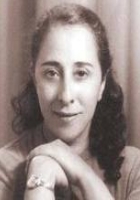Nazik Al-Malaika
Nazik Al-Malaika Poems
New Year, don't come to our homes, for we are wanderers
from a ghost-world, denied by man.
Night flees from us, fate has deserted us
We live as wandering spirits
...
She stood before the sun, screaming:
'Sun! You are like my rebellious heart
...
Why do we fear words
when they have been rose-palmed hands,
fragrant, passing gently over our cheeks,
and glasses of heartening wine
...
Nazik Al-Malaika Biography
Nazik Al-Malaika (August 23, 1923 – 20 June 2007[1]) (Arabic: نازك الملائكة), Al-Malaika in English: Angels, she was an Iraqi female poet and is considered by many to be one of the most influential contemporary Iraqi female poets. Al-Malaika is famous as the first Arabic poet to use free verse.[2] Al-Malaika was born in Baghdad to a cultured family. Her mother was also a poet, and her father was a teacher. She wrote her first poem at the age of 10.[2] Al-Malaika graduated in 1944 from the College of Arts in Baghdad and later completed a Master's degree in comparative literature at the University of Wisconsin–Madison with a Degree of Excellence.[3] She entered the Institute of Fine Arts and graduated from the Department of Music in 1949. In 1959 she earned a Master of Arts in Comparative Literature from the University of Wisconsin in the U.S., and she was appointed professor at Baghdad University, the University of Basra, and Kuwait University. Her father was a teacher . Al-Malaika published several books of poems:[4] her first book of poetry "Ashiqat al-Layl" ("Night's Lover(female)") after her graduation. She wrote "al-kolera" (Cholera) poem which considered by critics as a revolution in the Arabic poem in 1947. "Shazaya wa Ramad" ("Sparks and Ashes") followed in 1949. She published "Qararat al-Mawja" ("Bottom of the Wave") in 1957. her final volume "shagrt al-qamar" ("Tree of the Moon") being published in 1968. "wa yu3'ayer alwano albahr" ("And the sea change his color") in 1970 .[5] Al-Malaika taught at a number of schools and universities, most notably at the University of Mosul. Al-Malaika left Iraq in 1970 with her husband Abdel Hadi Mahbooba and family, following the rise of the Baath Party to power. She lived in Kuwait until Saddam Hussein invaded that country in 1990. Al-Malaika and her family left for Cairo, where she lived for the rest of her life. Towards the end of her life, Al-Malaika suffered from a number of health issues, including Parkinson's disease.[2] She died in Cairo, Egypt in 2007 at the age of 83.[1])
The Best Poem Of Nazik Al-Malaika
New Year
New Year, don't come to our homes, for we are wanderers
from a ghost-world, denied by man.
Night flees from us, fate has deserted us
We live as wandering spirits
with no memory
no dreams, no longings, no hopes.
The horizons of our eyes have grown ashen
the gray of a still lake,
like our silent brows,
pulseless, heatless,
denuded of poetry.
We live not knowing life.
New Year, move on. There is the path
to lead your footsteps.
Ours are veins of hard reed,
and we know not of sadness.
We wish to be dead, and refused by the graves.
We wish to write history by the years
If only we knew what it is to be bound to a place
If only snow could bring us winter
to wrap our faces in darkness
If only memory, or hope, or regret
could one day block our country from its path
If only we feared madness
If only our lives could be disturbed by travel
or shock,
or the sadness of an impossible love.
If only we could die like other people.
Translated from the Arabic by Rebecca Carol Johnson

i like the story